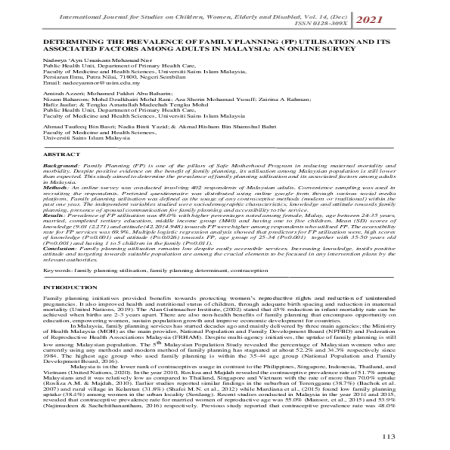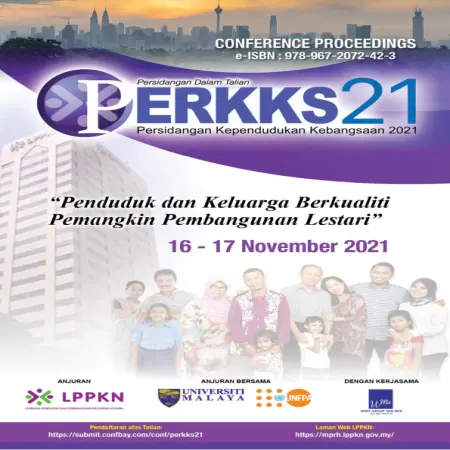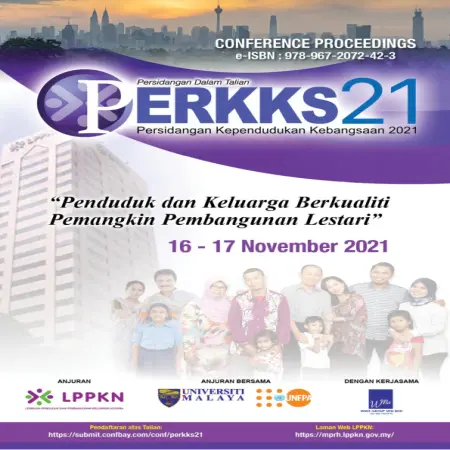TOPICS
|
|
Perceraian dalam kalangan wanita Melayu Terengganu
Item Type: Article
Editor:
Year: 00/12/2021
Abstract: This article analyzes the issue of divorce claims among Terengganu Malay women. Writing from a social history perspective, focusing on the period from 1963 to 1978 based on the written report of the Besut Kadhi Office obtained at the National Archives of Malaysia Terengganu Branch. The discussion of this article is divided into three parts. First, about background such as place of origin, age, length of time left, marital and family status and partner's occupation. Second, explain the factors that cause women to make complaints to religious parties that are related to the problem of neglecting alimony and responsibilities, polygamy and disappearing for a certain period of time. Third, removing the constraints faced such as hard-to-find couples who have migrated from their original area to a new place outside Terengganu or to another district in Terengganu as well as marriage with a partner from outside Terengganu. The findings of the study show that the Kadhi Besut Office plays an important role in solving problems related to the status of women who are suspended without strings. This study is expected to be able to fill the void in writing about Malaysian social history in general and gender studies in particular in the post-independence era.
|
|
|
|
|
|
Regulating retirement village in Malaysia; the way forward
Item Type: Article
Editor:
Year: 00/12/2021
Abstract: As Malaysia is predicted to be an ageing nation by the year 2030, developing a retirement village shall be an avenue for senior citizens to have a welfare and conducive placement for them to spend their time with value-added amenities that cater their special needs. This paper discusses the overview concept and elements of retirement village sector in Malaysia and other jurisdictions, and the possibility of having a sustainable legal framework in regulating the sector. The legal issues and possible unintended consequences that may arise out of the development of retirement village in Malaysia is also discussed in this paper.
|
|
|
|
|
|
Kemiskinan haid: krisis kesihatan awam yang perlu diakhiri
Item Type: Article
Editor:
Year: 00/12/2021
Abstract: Menstrual poverty is a situation when individual face difficulties in obtaining sanitary napkins (pads) or tampons due to financial constraints. It also refers to the lack or absence of sanitation facilities for managing menstruation such as no water supply or no proper waste disposal (sanitary pad) and no privacy to manage menstruation. In addition, lack of knowledge about menstruation and its management is another component of ‘menstrual poverty’. Awareness about ‘menstrual poverty’ needs to be created among the community and other stakeholders such as authorities associated with family and community institutions as well as volunteer organizations. Affected individuals also need to be empowered to speak out about the issues they face. With the pooling of resources and action from all stakeholders, this issue of ‘menstrual poverty’ can be addressed.
|
|
|
|
|
|
Determining the prevalence of family planning (FP) utilisation and its associated factors among adults in Malaysia: an online survey
Item Type: Article
Editor:
Year: 00/12/2021
Abstract: Family Planning (FP) is one of the pillars of Safe Motherhood Program in reducing maternal mortality and morbidity. Despite positive evidence on the benefit of family planning, its utilisation among Malaysian population is still lower than expected. This study aimed to determine the prevalence of family planning utilisation and its associated factors among adults in Malaysia.
|
|
|
|
|
|
Memperkasakan aspek penjagaan kanak-kanak melalui bantuan kewangan mampu meningkatkan penyertaan ibu bekerja dalam pasaran buruh
Item Type: Article
Editor:
Year: 00/12/2021
Abstract: Since the 2nd Malaysia Plan in fact, various efforts have been made by the government to empower the role of women in the labour market. One of that is employers are encouraged to provide childcare centers at work or in nearby areas to support the needs of married women with children. This is because, many studies state that many women quit their jobs when faced with difficulties of managing childcare in addition to the relatively increasing cost of childcare. Therefore, this quantitative study aims to examine the extent to which respondents are faced with the issue of access to childcare and the cost of childcare. The survey distributed online to 362 working mothers across Malaysia found that 55.8% still faced difficulties in finding childcare in their residential areas and 61.3% had problems finding childcare in their working area.
|
|
|
|
|
|
Peranan dan tanggungjawab masyarakat terhadap rumah kebajikan kanak-kanak
Item Type: Article
Editor:
Year: 00/12/2021
Abstract: This article tries to discuss the role of society on the lives of children in welfare home and the sustainability of welfare homes. For this purpose, the researcher has made more than 70 visits to Children’s Welfare Homes (Residential – Private/NGO). It involves 35 institutions covering eight districts in Selangor. This discussion is based on data from questionnaires, interviews and observations during visits. Interviews involve the highest administrators of the institution while monitoring the institution’s environment is a direct response through volunteer activities at the institution. The proposals presented are limited to the role of educational institutions and state welfare agencies.
|
|
|
|
|
|
Cabaran kesejahteraan suri rumah berpendidikan tinggi
Item Type: Article
Editor:
Year: 00/12/2021
Abstract: Highly educated women have crossed the mainstream by choosing housewife as a preferred career over a professional career. This step was taken as a solution to the problems of the household, a solution to the weakness of the childcare center and a preparation of children’s ability to meet the demands of a challenging world. This difficult decision was made as a struggle and investment of time to develop human capital as a national development asset. This conceptual paper uses library review techniques to understand and identify the challenges faced by highly educated housewives in developing well-being in life. Suggestions for developing the well-being of housewives are also discussed.
|
|
|
|
|
|
Empowering single mothers through institutional support: lessons from single mothers in Sabah
Item Type: Article
Editor:
Year: 00/12/2021
Abstract: Life can be challenging for single mothers. They are viewed as the most vulnerable social groups in society who often lack educational attainment, skills and social networks; thus, limiting their opportunities to compete in the labour market. Consequently, single mothers struggle to achieve financial independence and to support the well-being of their family. To help single mothers build a better life, it is crucial to provide single mothers with solid institutional support programmes. This paper explores the extent to which the institutional support programmes designed for single mothers are in accordance with the needs and expectation of the single mothers in Sabah. The views obtained from the leaders of the single mother associations show that the support programmes are useful for single mothers; however, the programmes are still inadequate to lift them out of poverty. Suggestions for improvement of the institutional support programmes for single mothers are highlighted.
|
|
|
|
|
|
Pengukuhan capaian vaksinasi HPV melalui perkhidmatan di Klinik Nur Sejahtera LPPKN: Suatu gambaran umum
Item Type: Book Section
Editor:
Year: 01/12/2021
Abstract: In Malaysia, Cervical Cancer remains among the top three most common cancers among women aged 15 to 44 years. Although the Malaysian Ministry of Health (MOH) has developed the Human Papillomavirus (HPV) Vaccination Program since 2007, the level of vaccination reach involving target groups in the country is still at a moderate level and not yet comprehensive. In support of efforts to ensure women’s reproductive health and well-being, the National Population and Family Development Board (NPFDB), an agency under the Ministry of Women, Family and Community Development has implemented an HPV vaccination program through Klinik Nur Sejahtera (KNS) nationwide.
|
|
|
|
|
|
Pencetus utama konflik perkahwinan sepanjang fasa pertama perkahwinan dalam kalangan pasangan muda: Kajian kes semasa Perintah Kawalan Pergerakan (PKP)
Item Type: Book Section
Editor:
Year: 01/12/2021
Abstract: The first phase of marriage is often associated with a crisis phase, an adjustment phase and a stress phase. The success of the young couple through this phase will ensure the stability of the marriage and the survival of the family institution. Divorce is a major threat to young couples in the first phase of marriage. This study aims to identify the triggers of marital conflict during the first phase of marriage (1-10 years) among young couples in the State of Selangor.
|
|
|
|














